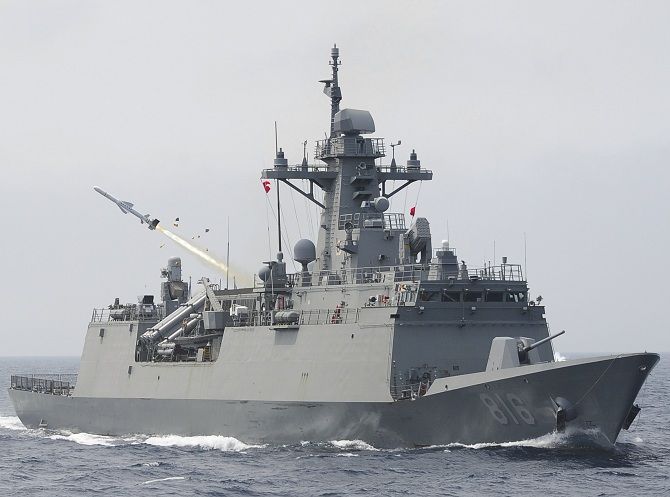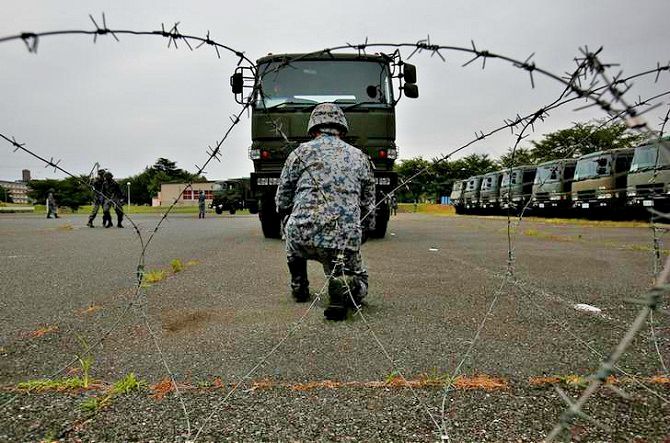'The world may be desirous of peace, but not Kim Jong-un.'
'Should we then accept the old adage that to maintain peace, we should be prepared for war?' asks Rajaram Panda.

Photograph: South Korean Defence Ministry
The last possible option in dealing with North Korea is a military strike.
Invoking this option could be disastrous for the United States and the Northeast Asian region. The use of nuclear weapons could become unpreventable with disastrous consequences to humanity.
US President Donald J Trump needs to remember that North Korea has threatened to 'ruthlessly ravage' the US if Washington attacks. US Defence Secretary Jim Mattis has warned that the consequences of any military action would be 'tragic on an unbelievable scale.'
America's two Asian allies -- Japan and South Korea -- will also face severe security risks. This makes this option avoidable.
If a hot war is to be avoided, China must help. But at the moment it finds itself helpless against a leader whose survival depends on nuclear deterrence.
The world may be desirous of peace, but not Kim Jong-un.
Should we then accept the old adage that to maintain peace, we should be prepared for war? That seems to be the present scenario.
If war breaks out now, both Japan and South Korea -- already in range of North Korea's missiles -- will face the brunt of the assault.
In addition, the US will have to worry about its 28,500 Marines in South Korea, and 300,000 US citizens in Seoul alone.
Photograph: Kind courtesy Wikimedia Commons
While speaking at a news conference in Warsaw with Polish President Andrej Duda after July 4, Trump warned North Korea that he was considering 'some pretty severe things' and that 'something will have to be done'.
He promised to 'confront very strongly'.
The possibility of war with an adversary that is openly defying the United Nations Security Council resolutions and threatening the US cannot be overlooked.
Trump is miffed because had the Intercontinental Ballistic Missile launched by North Korea on July 4 been on a standard trajectory -- and not on a lofted trajectory as was the case -- the missile could have reached Alaska.
Trump knows that with further testing, Pyongyang could achieve even longer ranges. So, military strike cannot be off the table for him.
Has Trump lost his 'strategic patience'?
Is he going to opt for more diplomatic and economic pressures or launch a military strike?
There is no clear picture at the moment, but good sense would dissuade Trump from exercising the military option.
While Trump did not elaborate on the options under consideration, Mattis said North Korea's launch of a missile capable of striking parts of the US did not bring the two nations closer to war.
Mattis further clarified that the US' 'self-restraint' had prevented conflict and that 'diplomatic efforts remain underway'.
This could suggest that the US, for now, is focused on a diplomatic response.
The US has 28,500 troops stationed in South Korea, and about 50,000 in Japan, and will be concerned about their safety if a war breaks out.
It has already installed the Terminal High Altitude Area Defense (THAAD) anti-missile system in South Korea.
Nikki Haley, the US ambassador to the United Nations, has assured Japan and South Korea of defence if their security is breached.
But if Trump's remarks of 'pretty severe things' mean a pre-emptive military strike, North Korea will not be expected to sit idle.
If war breaks out, both Japan and South Korea -- already in range of North Korea's missiles -- will face the brunt of North Korea's assault.
The 20 million people in Seoul could be cannon fodder for North Korean missiles and artillery guns.
Japan is not expected to be spared either.
Pyongyang is expected to use chemical and biological weapons that are believed to be in its possession.
Besides the 28,500 US Marines in South Korea, Trump must also worry about the safety of about 300,000 US citizens in Seoul alone.
From all indicators, war casualties would be heavy.
If war breaks out, the US and its allies might eventually emerge victorious, but the cost will be heavy and difficult to imagine.
The consequences of war and human suffering are likely to be more telling than what was seen in the 1950 to 1953 Korean War -- a time when North Korea had no nuclear or chemical weapons.
So, is military strike an option? Trump needs to ponder over this with a cool head.

Japan needs to worry about the prospect of a North Korean ICBM flying over Japan to reach the US as a realistic possibility.
Photograph: Issei Kato/Reuters
What is Japan's role in this?
After it was confirmed that the missile launched by North Korea July 4 was an ICBM, Japan now needs to worry about the prospect of a North Korean ICBM flying through the sky over Japan towards the US as a realistic possibility.
Can Japan legally intercept such a missile, an operation that is to be conducted under strict conditions and within high technological barriers?
Though it is legally possible for Japan to do so as the security-related legislation came into force in March 2016, there are still doubts on its interpretations.
According to a July 2014 legislation, there are three conditions regarding the use of force: An armed attack occurs and threatens Japan's survival; there are no other appropriate means to protect Japan's people; and use of force is restricted to the minimum necessary.
If these three conditions are met, only then can Japan use force and shoot down a ballistic missile heading toward the US.
Both Hawaii and Guam could come under North Korea's target.
While Hawaii is the home of the headquarters of the US Pacific Command, Guam can be the base for launching operations to respond to a contingency on the Korean Peninsula.
Japan is unsure whether it could legally intercept a missile fired by North Korea under this situation.
If war breaks out, and the Japanese government determines that its survival is in danger, it could intercept a missile as a self-defence measure.
But during peacetime, it would legally not be able to shoot down an ICBM targeted toward the US.
Moreover, Japan's capacity to intercept a North Korean ICBM is limited.
Given such complexities, a military strike is definitely not an option that Trump must have in his basket of options.
While the US and other stakeholders need to continue pursuing diplomatic pressure and tighten economic sanctions, efforts need to be invigorated to get China on board on all decision-making process.
Though the US has dismissed a Russian-Chinese 'freeze-for-freeze' plan -- in which North Korea halts its nuclear-arm development and the US and South Korea suspends joint military drills -- the goal to encourage dialogue with China and Russia still remains open.
The security dynamics in the region is messy. This demands decisive policy response from all stakeholders.
Dr Rajaram Panda is currently the Indian Council for Cultural Relations India Chair Visiting Professor at Reitaku University, Japan.
The views expressed are the author's own and do not represent either of the ICCR or the Government of India.










